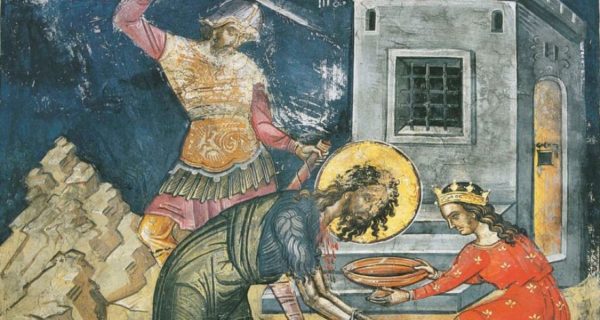Around the year 303 AD, under the reign of the Roman emperor Diocletian, the Christian priest Felix was captured and ordered to offer incense to idols of Romans gods. The statues fell shattered at his feet when he prayed. He was tortured to no avail and then led to execution. This short story portrays the author’s vision of what his road to execution may have looked like.
The unknown martyr included in this story was named “Adauctus” by the Christians, or ‘the additional one.’ The question of both his and Felix’s actual existence is debatable, but they have long been venerated in the Catholic Church. Upon reading the story of the nameless martyr and his companion, I was inspired to tell their tale anew.
***
As Felix, shoved by the guards, stepped out into the open, he saw the streets surrounding the prefect’s palace were suffocated with people: free and slave, publican and patrician, there was no distinguishing between the members of the angry hoard now surrounding the building. As the great doors fell shut behind him and the small company of soldiers, whose cloaks blistered blood-red under the Italian sun, the crowds roared with even greater volume. Two of the soldiers gripped Felix’s arms; their hands stung his skin, which was freshly broken from flogging. Still, the gentle joy deep in Felix’s blue eyes remained unchanged.
The crowd surged up the steep marble steps, so the escort of soldiers around Felix was forced to become a shield for him against the mud, stones, and abuse the angry Romans hurled. It seemed like an eternity before the party reached the base of the stairs. The road ahead to the place of execution was, in truth, short, but the prospect of shoveling through crowds for even another hundred meters seemed to drain the last of his energy. He was grateful when the leader of the unit – who was also serving as the executioner that day – turned to his second-in-command.
“They’ve gone mad!” he shouted. “Get back up to the palace and send reinforcements to clear the roads!”
The second-in-command turned and make his way back up the stairs, disappearing inside the palace doors. Soon, two fresh columns of soldiers marched down the steps, past Felix’s escort, and the mob began to vacate the roads. Felix and his guards were able to proceed; raising his eyes to heaven, Felix thanked God. Words of comfort flooded his soul.
It will soon be over. You have done well; we will be together soon. Your hour is at hand, but I will be with you.
The two guards holding Felix’s arms were surprised to see the priest smile. One of them, a young man who had recently entered the army, wondered how the crowds could have been so angered by the gentle, joyful man they were leading to death. Perhaps this man knew something the rest of them didn’t. The young guard suddenly felt a wave of shame at being a part of the execution he had rather looked forward to. It didn’t seem the same as he had imagined.
The prisoner somehow sensed this and looked at him. “Do not worry; this path is my road to Heaven,” he said.
The young guard outwardly ignored him, as any conversation between them would be inappropriate, but the strange words of the old priest reached his soul. For years to come he would remember the day a convict had tried to comfort his persecutor.
The crowds may have been cowed by the arrival of additional guards, but there was still a tangible unease, an angry murmur running low and thick as summer humidity through the street. Just as the quiet reached the height of its tension and Felix could glimpse the place of execution through the shoulders of the men in front of him, the guards halted suddenly. Turning in confusion, Felix saw a young man stepping out from the crowd to bar the way of the Roman company.
The young man was about twenty, tall and broad-shouldered, with dark features and very dark eyes. The executioner gestured at him violently. “Clear the road!” he barked, but the young man did not move. Felix saw his hands trembling, but the dark eyes were steadfast as they gazed into the executioner’s.
“I believe what your prisoner believes and I will die with him to glorify the same Lord, Christ.” His words hung in the now complete silence. The young man’s eyes rested on Felix’s face, and Felix smiled his soul overflowing with joy.
For a moment, the executioner was dumbfounded. Then he shrugged and muttered, “Die with him, then.”
The soldiers seized the young man and clapped iron around his wrists. At a shove from the guards, the new prisoner staggered to stand next to Felix. The priest could see the absolute exhaustion on the young man’s face and knew how much his valiant action had cost his courage. “Come, my friend,” Felix said in his gentle voice, taking the young man’s hand in his own. “This is how we begin. Give thanks to the Lord, for He is good.”
“His love is everlasting,” the young man responded, a smile lighting his features.
“For strong as death is love,” said Felix.
“And stubborn as the underworld is its devotion,” the younger replied.
The two men knelt, side by side, before the execution block, while the onlookers gazed in amazement at the two convicts comforting one another. Had they gone mad?
“And the Master of the house said to the servant, ‘You have done well, my good and faithful servant,” the dark-eyed man continued, meeting Felix’s blue eyes from across the block with a look of peace. The executioner’s sword rasped from its sheath and hissed downwards, cleaving the air as it fell. Felix felt a thrill rush through him.
“Come, share your Master’s joy,” he whispered.
